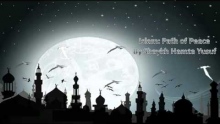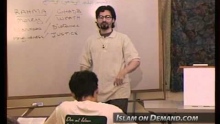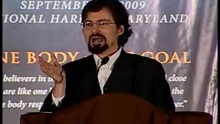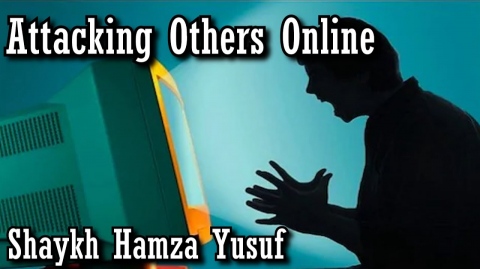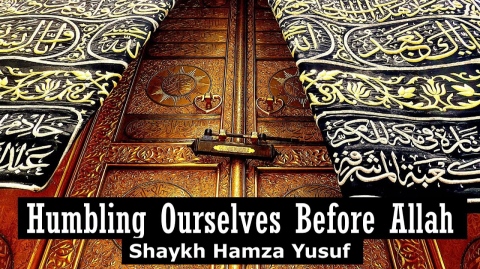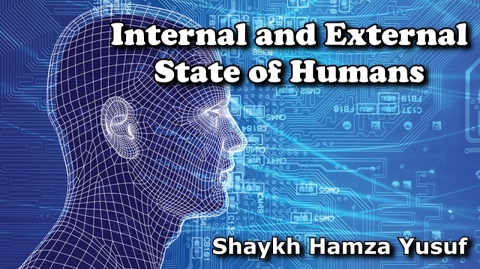Shaykh Hamza Yusuf Talks about Sufism
12 years ago
10:47
65,494 views
Shaykh Hamza Yusuf Talks about Sufism
This is from the lectureTitled "Changing our Condition".
To watch the full lecture:
http://www.youtube.com/watch?v=D2IJ-gaAGbQ
Lecture about Sufism:
"World of Spirituality, Tasawwuf, Sufis & Shaykhs - Mufti Muhammad ibn Adam al-Kawthari"
http://www.youtube.com/watch?v=I43IriBx4BE
SHaykh Hamza Yusuf on Taking a Sufi Shaykh
Question: How necessarily important is it to commit to one shaykh to develop your spirituality?
Answer:
You'll get different opinions depending on who you ask. There's a nice translation of Ibn Abbad's letter on whether its obligatory to take a shaykh. There's a saying, "Whoever doesn't have a shaykh, Shaytan is his shaykh." Generally, first and foremost it means you have to have a teacher for the Shariah. You have to have someone who teaches you the religion. When we visit Sh. Mimmar (spelling?) the other day, what did he keep saying? "Get teachers even if you have to pay them. Have teachers. You need teachers to guide you. You need to have sources of knowledge." In terms of spiritual advancement, if people are having spiritual experiences its good to have people who know what they are doing. Suhba (companionship) is also good. Many of the shuyukh of this period, like Shaykh Ahmad Mashur al-Haddad, who I studied with, Dr. Umar studied with, Sidi Abdul Hakim Winters studied with- he was of the opinion that the idea of taslim was over, the surrendering yourselves to a shaykh completely was over, this wasn't its time. And there are a lot of dysfunctional aspect in a lot of relationships that happen, so there are problems in all these systems. And surrendering your sovereignty, you have to be very careful with that, who you surrender your sovereignty to, some people demand a lot. There's a poem by Robert Frost, "They say the truth will make you free, my truth will make you slave to me." So you just have to be careful, there's a lot of manipulation out there. People from Pakistan know very well about the peer sahibs, and what happens there. I'm not making this up, am I? A lot of these people are flat-out charlatons, there's charlatans all over West Africa, you know 'Sufi shaykh, come and be a murid.' The danger of Sufism that bothers me, is there are a lot of principles in Tasawwuf that are very easily manipulated into certain cultic control mechanisms and they become very dangerous. I think for those of us in the West, we come from a tradition of individual sovereignty and independence of self. And I personally believe those are very high Islamic characteristics and qualities. I think a lot of the problems in the East is all this slavishness, and devotion and obsequiousness to the grand Master Pu-Ba whoever. I mean, if you want my personal opinion, I do believe that. That does not mean I don't show the utmost respect to my teachers. Sh. Abdullah bin Bayyah is my teacher and what I love about him is he's somebody who respects my opinion, listens to my opinion, he's never been despotic in any way. Habib Ahmad Mashur al-Haddad was not despotic at all, he didn't get angry at people, he didn't abuse people. Sifadur Harawi was like that. You just have to look to people and observe them. You just have to be careful. And then there are some people who are just deluded or they are trying to keep something alive and they have their limitations. Sidi Ahmad Zarruq said that there weren't any complete teachers by his time, the 9th century, the completed masters were gone and to just find people that could do the best that they could do and recognize their shortcomings and don't have greater expectations that they can do that. Wallahu Ta'ala Alaam. Allah knows best.
--Taken from Shaykh Hamza Yusuf's CD set on Tasfiyah al-Qublub, (Refinement of the Heart) by Imam Ibn Juzayy al-Kalbi, CD 12, Track 3 and 4 (copyright)
This is from the lectureTitled "Changing our Condition".
To watch the full lecture:
http://www.youtube.com/watch?v=D2IJ-gaAGbQ
Lecture about Sufism:
"World of Spirituality, Tasawwuf, Sufis & Shaykhs - Mufti Muhammad ibn Adam al-Kawthari"
http://www.youtube.com/watch?v=I43IriBx4BE
SHaykh Hamza Yusuf on Taking a Sufi Shaykh
Question: How necessarily important is it to commit to one shaykh to develop your spirituality?
Answer:
You'll get different opinions depending on who you ask. There's a nice translation of Ibn Abbad's letter on whether its obligatory to take a shaykh. There's a saying, "Whoever doesn't have a shaykh, Shaytan is his shaykh." Generally, first and foremost it means you have to have a teacher for the Shariah. You have to have someone who teaches you the religion. When we visit Sh. Mimmar (spelling?) the other day, what did he keep saying? "Get teachers even if you have to pay them. Have teachers. You need teachers to guide you. You need to have sources of knowledge." In terms of spiritual advancement, if people are having spiritual experiences its good to have people who know what they are doing. Suhba (companionship) is also good. Many of the shuyukh of this period, like Shaykh Ahmad Mashur al-Haddad, who I studied with, Dr. Umar studied with, Sidi Abdul Hakim Winters studied with- he was of the opinion that the idea of taslim was over, the surrendering yourselves to a shaykh completely was over, this wasn't its time. And there are a lot of dysfunctional aspect in a lot of relationships that happen, so there are problems in all these systems. And surrendering your sovereignty, you have to be very careful with that, who you surrender your sovereignty to, some people demand a lot. There's a poem by Robert Frost, "They say the truth will make you free, my truth will make you slave to me." So you just have to be careful, there's a lot of manipulation out there. People from Pakistan know very well about the peer sahibs, and what happens there. I'm not making this up, am I? A lot of these people are flat-out charlatons, there's charlatans all over West Africa, you know 'Sufi shaykh, come and be a murid.' The danger of Sufism that bothers me, is there are a lot of principles in Tasawwuf that are very easily manipulated into certain cultic control mechanisms and they become very dangerous. I think for those of us in the West, we come from a tradition of individual sovereignty and independence of self. And I personally believe those are very high Islamic characteristics and qualities. I think a lot of the problems in the East is all this slavishness, and devotion and obsequiousness to the grand Master Pu-Ba whoever. I mean, if you want my personal opinion, I do believe that. That does not mean I don't show the utmost respect to my teachers. Sh. Abdullah bin Bayyah is my teacher and what I love about him is he's somebody who respects my opinion, listens to my opinion, he's never been despotic in any way. Habib Ahmad Mashur al-Haddad was not despotic at all, he didn't get angry at people, he didn't abuse people. Sifadur Harawi was like that. You just have to look to people and observe them. You just have to be careful. And then there are some people who are just deluded or they are trying to keep something alive and they have their limitations. Sidi Ahmad Zarruq said that there weren't any complete teachers by his time, the 9th century, the completed masters were gone and to just find people that could do the best that they could do and recognize their shortcomings and don't have greater expectations that they can do that. Wallahu Ta'ala Alaam. Allah knows best.
--Taken from Shaykh Hamza Yusuf's CD set on Tasfiyah al-Qublub, (Refinement of the Heart) by Imam Ibn Juzayy al-Kalbi, CD 12, Track 3 and 4 (copyright)


 English
English Български
Български No filter
No filter